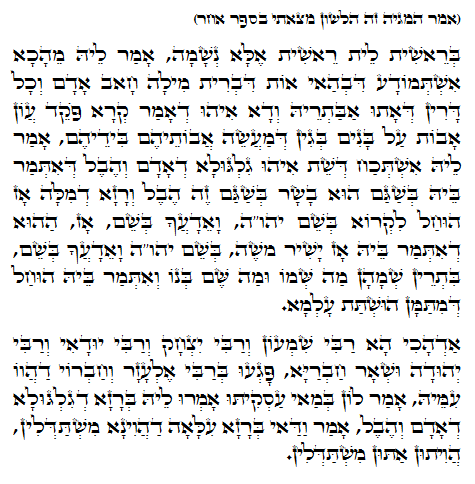Daily Zohar – Tikunim – # 852 – Then and Then
Click here to listen to the Daily Zohar [audio:https://dailyzohar.com/wp-content/uploads/audio/dz852.mp3|titles=Daily Zohar 852]

Hebrew translation:
בְּרֵאשִׁית, אֵין רֵאשִׁית אֶלָּא נְשָׁמָה. אָמַר לוֹ, מִכָּאן נוֹדָע שֶׁבְּאוֹת בְּרִית הַמִּילָה הַזּוֹ חָטָא אָדָם וְכָל הַדּוֹרוֹת שֶׁבָּאוּ אַחֲרָיו, וְזֶהוּ שֶׁאָמַר הַכָּתוּב פֹּקֵד עֲוֹן אָבוֹת עַל בָּנִים, מִשּׁוּם שֶׁמַּעֲשֵׂה אֲבוֹתֵיהֶם בִּידֵיהֶם. אָמַר לוֹ, נִמְצָא שֶׁשֵּׁת גִּלְגּוּל שֶׁל אָדָם וְהֶבֶל, שֶׁנֶּאֱמַר בּוֹ בְּשַׁגַּם הוּא בָשָׂר, בְּשַׁגַּם זֶה הֶבֶל, וְסוֹד הַדָּבָר – אָז הוּחַל לִקְרֹא בְשֵׁם יהו”ה, וָאֵדָעֲךָ בְּשֵׁם, אָז, אוֹתוֹ שֶׁנֶּאֱמַר בּוֹ אָז יָשִׁיר מֹשֶׁה, בְּשֵׁם יהו”ה וָאֵדָעֲךָ בְּשֵׁם, בִּשְׁנֵי שֵׁמוֹת, מַה שְּׁמוֹ וּמַה שֶּׁם בְּנוֹ, וְנֶאֱמַר בּוֹ הוּחַל, שֶׁמִּשָּׁם הֻשְׁתַּת הָעוֹלָם.
בֵּינְתַיִם הִנֵּה רַבִּי שִׁמְעוֹן וְרַבִּי יִצְחָק וְרַבִּי יוּדָאִי וְרַבִּי יְהוּדָה וּשְׁאָר הַחֲבֵרִים פָּגְשׁוּ אֶת רַבִּי אֶלְעָזָר וַחֲבֵרָיו שֶׁהָיוּ עִמּוֹ. אָמַר לָהֶם, בַּמָּה עֲסַקְתֶּם? אָמְרוּ לוֹ, בְּסוֹד הַגִּלְגּוּל שֶׁל אָדָם וְהֶבֶל. אָמַר, וַדַּאי בַּסּוֹד הָעֶלְיוֹן שֶׁהָיִינוּ מִתְעַסְּקִים אַתֶּם הֱיִיתֶם מִתְעַסְּקִים.
Tikkun 69 – 92
Seth, שת, was incarnation of Adam and Abel that after he was born
Genesis 4:26
“ וּלְשֵׁת גַּם-הוּא יֻלַּד-בֵּן, וַיִּקְרָא אֶת-שְׁמוֹ אֱנוֹשׁ; אָז הוּחַל, לִקְרֹא בְּשֵׁם יְהוָה”
“And to Seth, to him also there was born a son; and he called his name Enosh; then (אָז) began men to call upon the name of YHVH”
The Zohar refers to the word אָז (then) as a starting point in the past and in the future. The first link is to Moses in his first incarnation, Seth. (Moses’s original soul was Abel and the first incarnation was Seth)
The second link is after overcoming the Egyptians crossing the Red Sea.
Exodus 15:1
“ אָז יָשִׁיר-מֹשֶׁה וּבְנֵי יִשְׂרָאֵל אֶת-הַשִּׁירָה הַזֹּאת, לַיהוָה”
“Then (אָז) Moses will sing and the children of Israel this song unto YHVH”
There are many commentaries to this puzzling Torah verse.
The Israelites just crossed the Red Sea that was miraculously split for them and the verse says that ‘then Moses WILL sing’. Why is the use of future tense in this event when the proper form is to say Moses sang in past tense (like most corrupted Bible translation that tries to make sense out of the biblical story and the cryptic Torah).
The answer is that the Torah gives us a ‘window’ to the future. Like the way Moses delivered us from Egypt to give us the Torah so it will be in the future and Final Redemption.
The prophecy of Micha reveals the connection of Moses to the First and Final Redemption.
Micha 7:15
“ כִּימֵי צֵאתְךָ, מֵאֶרֶץ מִצְרָיִם, אַרְאֶנּוּ, נִפְלָאוֹת”
“’As in the days of thy coming forth out of the land of Egypt will I show unto him marvellous things.’”
{||}

 Previous: Tikunim
Previous: Tikunim

